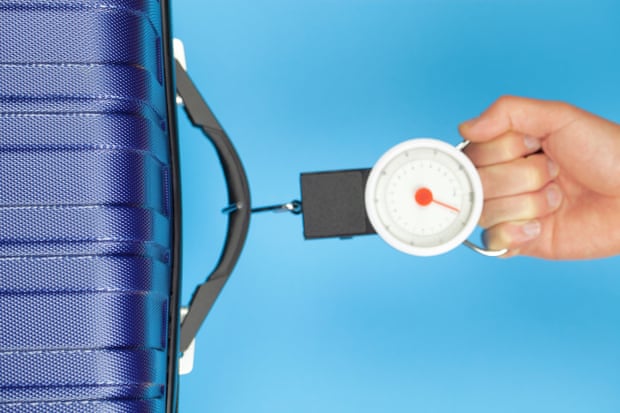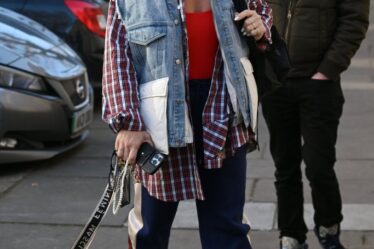
If you’ve ever stood at an airport luggage terminal watching other people’s suitcases clunk onto the carousel before finally realising – with a similar thud – that yours is not among them, you may be toying with the idea of the hand-luggage-only holiday.
It’s a trend that’s taking hold with particular urgency in 2022, thanks to the sharp spike in lost luggage in airports around the world. According to transport IT company SITA, 2021 saw a 24% uptick in airlines “mishandling” luggage – meaning lost or delayed – compared to 2020. And 2022 is looking even worse.
In the US, approximately one in every seven bags in the first quarter of 2022 vanished – permanently or temporarily – and a baggage handler told Guardian Australia this month that one in ten bags are not making it onto planes on Qantas’ domestic services.
But is it practical, or even possible, to holiday for a reasonable length of time with only carry-on baggage? Absolutely, says the designer and former magazine editor David Clark. In 2008, he took a three-month round-the-world trip to 17 cities across Europe, Asia and both Americas, with everything he needed popped into a trusty carry-on.
“I started with the bag,” Clark says. “It was a soft wheelie bag with a detachable backpack and I checked with every airline I’d be travelling on to make sure it fit with their requirements.”
This, says every carry-on baggage evangelist, is the most critical step of all – more important than any considerations about colour-coordinated outfits or fancy roll-or-fold packing methods.
“Not only will it ensure a seamless check-in process, but it will also give you a guide to how much space you have to maximise,” says Kirsty Lucas, the Australian country manager for budget international airline Scoot, adding that her airline allows for two pieces of luggage totalling 10kg in the cabin. Qantas economy domestic permits two pieces adding up to 14kg, while Virgin caps things at 7kg.
Ann Vodicka, a stylist and former Qantas in-cabin service manager now with Image Confidence, has a hanging hook scale at home and makes sure she weighs her baggage before she leaves the house.
To build his travel wardrobe, Clark turned to his local adventure store, packing New Zealand wool climbing gear in basic blue: t-shirts, zipper tops and hoodies.
Sign up to receive Guardian Australia’s weekend culture and lifestyle email.
“They’re designed to wick away moisture so you don’t get any odour. And you can easily wash them in a sink on the go,” he says. He also added jeans, a pair of dress pants and a dress jacket for evenings, but his smartest trick was to stick to a single pair of shoes.
“They were beautiful black leather shoes which I found extremely comfortable and that’s all I wore – no sneakers or anything else. I wore them to climb mountains outside of Rome and sloshing through water in Buenos Aires. And then I could wear them out to dinner.”
Vodicka also imposes strict numerical limits on her luggage. “If you pack three bottoms, five tops and two pairs of shoes, you can mix and match that into 30 different outfits,” she says.
She suggests you fold items using the space-saving Konmari method – neat little rectangles – and buy a small spray bottle that you can fill with water at the other end to spritz your clothes to get rid of wrinkles.
Another trick? “Decant your toiletries into small containers – Muji make great travel bottles,” she says. That way you can be sure that your moisturisers and cleansers stay under the airlines’ restrictions around liquids and aerosols, which can be as little as 100ml.
It’s even possible to skip the baggage carousel when travelling with kids, according to Jessica Mostogl, who regularly flies with her three boys – aged seven, four and eight months – with only carry-on. Her number one piece of advice is to buy what you need when you get there.
“Nappies, formula and snacks – get it all from a supermarket at the destination,” she says. “And check if your accommodation has a washing machine. If you can wash, you can halve the kids’ clothing.”
But perhaps more important than what you pack, says Vodicka, is what you leave behind. Train yourself to ditch that niggling voice that gnaws at every overpacker: the one that says “what if” or “Just in case”.
“Unless you’re going somewhere really remote, if you really need something, you’ll be able to buy it,” she says. “Just step away from the fear.”
Once you do that, says Clark, you can lean into the liberty. “Nothing feels better than going out into the world with little more than a few clothes, your swimmers and your passport,” he says.
Except, perhaps, marching smugly past all those people drumming their fingers at the baggage carousel.



